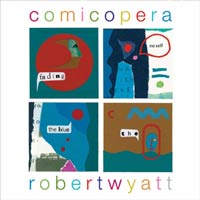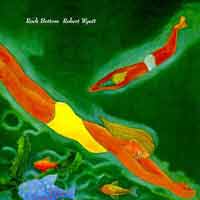| Archiveintrag #5458 (623040) | |||||||||||||||||||
 auf erweiterter Jahresliste auf erweiterter Jahresliste  Plattentipp Plattentipp |
|||||||||||||||||||
|
|
||||||||||||||||||


Mit u.a. Eno, Manzanera, Paul Weller. In 3 Akte unterteilt. Nr. 1 (5 Songs) klingt auf seine charakteristische Art etwas "außerweltlich", ein par cm über dem Boden, aber sehr songorientiert und melodiös, dezent melancholisch, schleppend bis flächig, entspannt und recht leicht. Jazzspritzer in manch Harmonie, Rhythmus und den Bläsern auf absolut typische Art, gerade auch die wunderbaren weichen warmen feinstens verwobenen Bläser in Verbindung mit den aparten Keyboards(-Flächen) und Piano. Wie er die Melodien, Motive der (manchmal wieder klangmalenden) Stimme und Instrumente umeinander kreisen, sich durchdringen läßt, ist etwas Besonderes (auch in den anderen Akten). Nr. 2 (6 Songs) ist insgesamt bodenständiger, z.T. einfach strukturiert, teils konventionell-songhafter, ob Folk- oder Jazzcharakter oder ureigener Balladencharme (oder in reizvoll-avantgardistischem Ambiente). Zur Hälfte mit Gitarre, weniger Bläser. Akt 3 (5 Songs), ein eher düsterer meist spanisch gesungener, greift Elemente des 1. auf, enthält ein abgefahrenes Vibraphon-Keyboard-Duett, vokale Verfremdungen, ein großartiges Carlos Puebla-Cover (Hasta Siempre Comandante) zwischen Latin/Kuba und Jazz, zwischen subtil und handfest; und das längste und beste Stück, mit Bläsern, Streichern, Chor: Dunkel, hypnotisch, faszinierend, grandios!
More immediately accessible and warm than Cuckooland, more ambitious than Shleep, Comicopera, in three acts, is the end result of Robert Wyatt looking around and examining the craziness and wild unpredictability in real life in 2007. Knowing one man's opinion of things hardly matters, he brings together musicians from Israel, Spain, England, Norway, Cuba, Brazil, and Colombia in songs that originate with him, but also from these places and Italy. It's full of humor, horror, absurdity, shoulder-shrugging "what?"-styled confusion, exasperation, and even nostalgia, though his particular brand of that is with the eyes wide open. The sound of the record is what immediately separates it from its predecessors: it feels more like a recording made in a studio with a live band than one assembled in pieces. And indeed, in many cases, that's what happened. Old friends like Brian Eno, Phil Manzanera, and Annie Whitehead are present, some not so old ones like Paul Weller and Karen Mantler, and other collaborators he has more recently encountered in Anja Garbarek, Orphy Robinson, Yaron Stavi, Mônica Vasconcelos, Gilad Atzmon, Chucho Merchán, Maurizio Camardi, and Alfonso Santimone, just to name a few, with songwriting contributions from his companion Alfie Benge, Garbarek, and Eno, among others. The first five tracks, under the heading "Lost in Noise," are centered on personal observations of love and loss, and at 62, Wyatt has seen his share of friends pass on and ends with a bomb going off.
The middle section "The Here and Now," from cuts six through eleven, examine what it actually means to be English under these circumstances — i.e. in a war — and the third, "Away with the Fairies," in tracks 12-16, is where Wyatt's narrator, utterly fed up with the messiness, violence, conflict, and the real noise of life, completely abandons singing in the English language. The truth of the matter is it sounds far more "high concept" than it is. Wyatt claims that his method of working is that he just collects bits of things and puts them together. The songs in the first section are lovely, tender, bittersweet, airy, and melancholic. On "Stay Tuned," Wyatt sings as a narrator who is nothing more than particles of air: "In between/lost in noise/somewhere/somewhere..." as Garbarek's voice soars wordlessly above in between verses, as Eno's keyboards and effects, Seaming To's clarinet and harmony vocal, Whitehead's trombone, and Stavi's bass violin create a kind of chamber jazz around those words, hovering in the front. Letting the words assert themselves like a whisper in the ear or a voice in a dream, Vasconcelos takes the lead vocal as the accusing betrayed lover on the jazzy pop ballad "Just as You Are," and Wyatt takes on the mess, about trying to make excuses. The center is punctuated by Paul Weller's guitar, Wyatt playing hand percussion, and Stavi's bass violin creating the most taut sort of discomfort between the voices. England becomes a place where there is a beautiful day for walking about — as Manzanera's guitar strolls along through "A Beautiful Peace" before Wyatt lets the cat out of the bag: "but not here," because a bomb has gone off and war has begun.
Religion gets skewered too — albeit with his characteristic subtle and dry wit despite the very real anger and emotion — and the jazz just keeps coming. Wyatt's narrator switches places amid the finger popping subtle jazz and lilting rock tunes and he becomes the bomber (he makes no distinction as to which one is officially military or terrorist because all the man wants is peace, not bombs of any kind) as well as the bombed, who have either no idea what the hell is going on or who have done their own part to participate by their blind and numb assent. There is a hint of what's to come in part three with the instrumental "On the Town Square," with Wyatt on cornet, Del Bartle on electric guitar, and Gilad Atzmon's tenor saxophone, all playing around a killer rhythm by Robinson on steel pans. ("A Beautiful War" is a scathing indictment of the wars we watch on TV without wondering about the consequences of them.) His and Mantler's voices here are almost like nursery rhymes: "It's a beautiful day/For a daring raid/I can see my prey from afar/So I open the hatch/And drop the first batch/It's a shame I'll miss the blaze/But I'll see the film within Days/And I'll get to see the replay/Of my beautiful day..." On the next cut, "Out of the Blue," the aftermath of such actions becomes clear: he and Eno wrap their voices in something akin to true strangeness and horror: "For Reasons beyond all understanding/You've blown my house apart/You've set me free/To let you know/you've planted/everlasting hatred in my heart/You've planted your everlasting hatred in my heart." Jazz is a not so subtle subtext here, as a social force as well as an aesthetic one, and while these songs of Wyatt's and his collaborators may not be rooted in what Blue Note releases these days as acceptable, they are far more interesting.
These tunes are also quite literally almost as accessible in their way as anything on the mighty Domino imprint (Franz Ferdinand's home) that this set has been issued on, even without screaming guitars and popping snare drums.
In the third section, Wyatt's protagonist just goes off to find out what else is in the world, singing in Spanish and Italian. Poems by Lorca are set to music (and Wyatt plays a mean pocket trumpet as well as keyboards, and handles percussion). Abandonment of the conflict seems like the only proper thing for a world citizen to do. Here is where players like Robinson playing steel pan drums and vibes, subdued Latin and Caribbean rhythms, and jazz all get mixed up together in a seamless and quite lovely brew. (Check the instrumental by Robinson called "Pastafari.") The final cut may be a bit troubling in that it is a reading of Carlos Puebla's homage to Che Guevara, "Hasta Siempre Comandante." But it's nostalgic, not defiant; not blind assent, but a reverie, that if anything seems to wonder what happened to get from idealism to this place the protagonist finds himself in. And, if idealism is to come from anywhere, it must come from outside the English-speaking world. It's one of the hippest tracks here, played by a killer Italian band (with help from the voices of Wyatt, Mantler, and Vasconcelos), playing a wonderful meld of rhumba and jazz. Comicopera may not be all comic, and indeed inverts the entire comic opera notion of beginning with a catastrophe and ending with redemption, but Wyatt's never been so simple. What he has been, however, is close to brilliant, and this delightfully engaging little set will, if heard, more likely than not bring more people sniffing 'round his large body of work than anything he's done since the early '90s.
(by Thom Jurek, All Music Guide)
| mehr von " Robert Wyatt" | |||
 |
Robert Wyatt | "Rock Bottom" | |
| Virgin (Jun 1974) | |||
 |
Robert Wyatt | "Ruth Is Stranger Than Richard" | |
| Virgin/Thirsty Ear (Sep 1975) | |||
 |
Robert Wyatt | "Shipbuilding" | |
| Rough Trade (1982) | |||
 |
Robert Wyatt | "Shleep" | |
| Hannibal (1997) | |||
| Zurück |
|
Oben |
| Erstellt: 07.2003 | Letzte Aktualisierung: 19.09.2021 15:44 | 74551 Besucher seit dem 12.09.2021 |
| Homepage im neuen Fenster | We’re Waiting For Louise! | © Webmaster: |